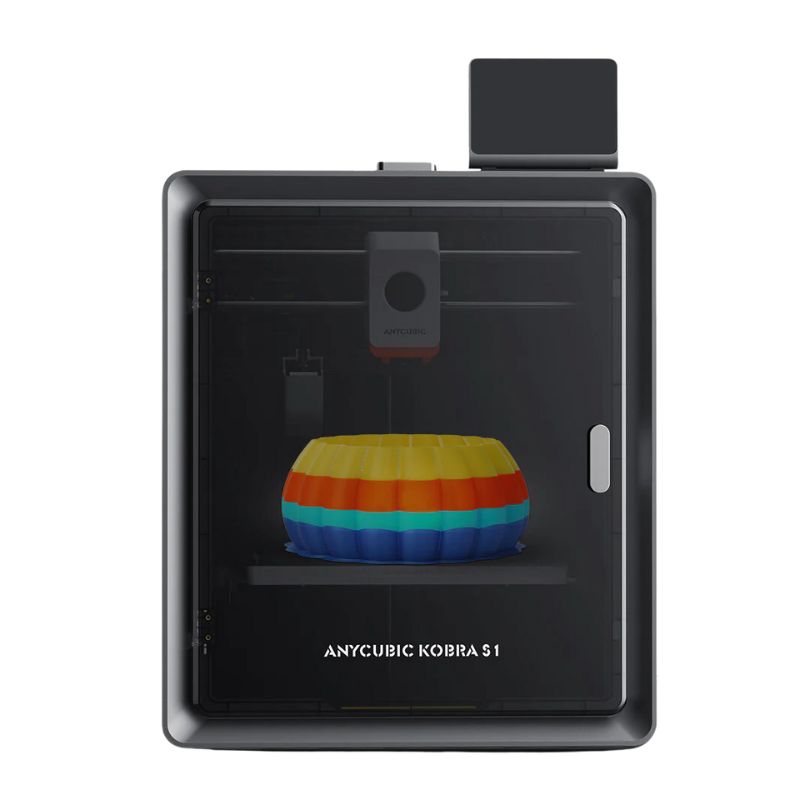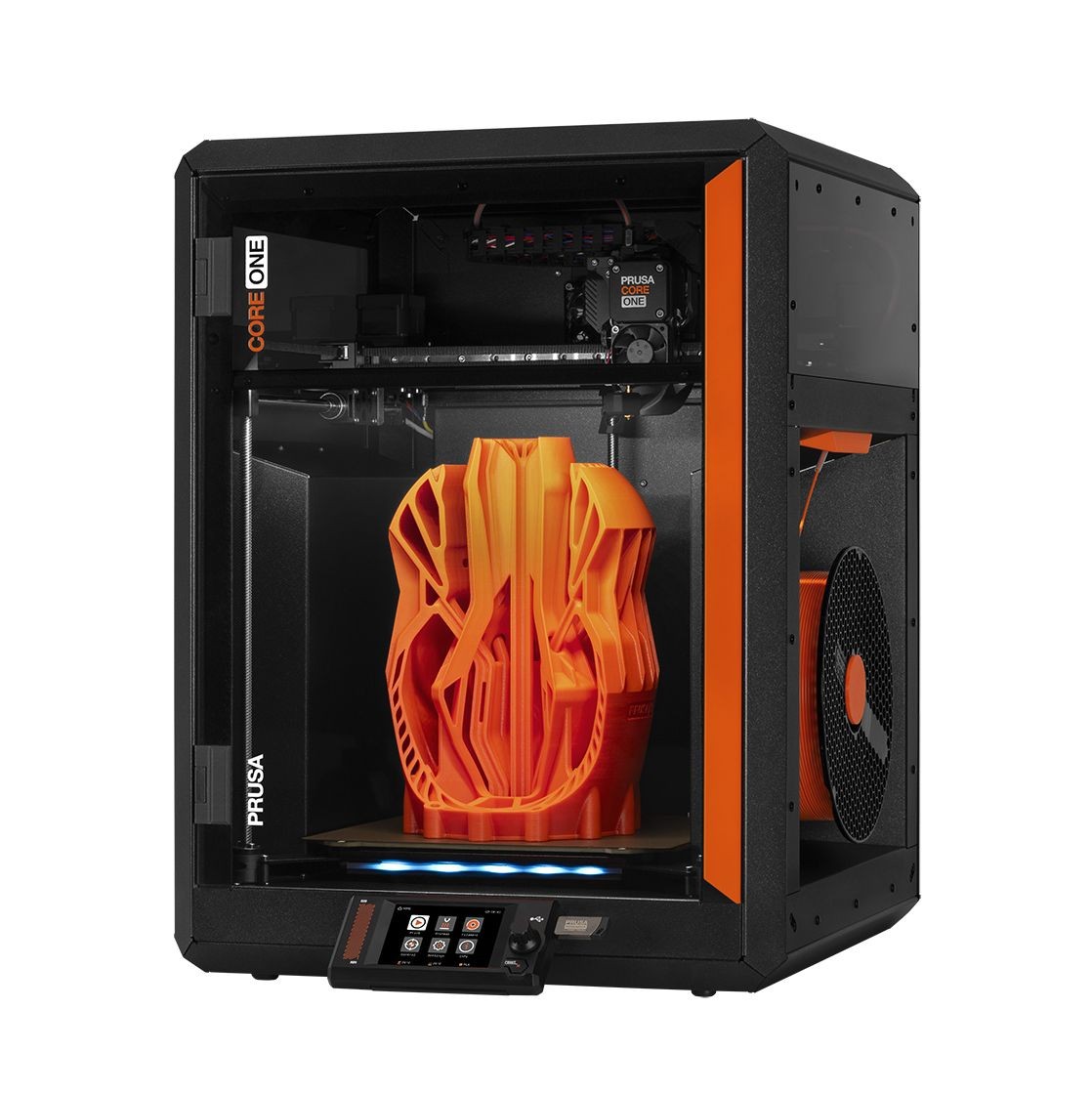Compare Kobra S1 Combo vs Core One
Comparison between the best 3D printers
Choose the best 3D printer at the best price. The cheapest 3D printers are here.
Buy a 3D printer here with 3D Fila.
 |
 |
|
| Model | Kobra S1 Combo[BUY Kobra S1 Combo] |
Core One |
| Printing Material | Filament | Filament |
| Buy Filament for Anycubic Kobra S1 Combo | Buy Filament forPrusa Core One | |
| Estimated price | $599,00 | $1200,00 |
| Manufacturer | Anycubic | Prusa |
| Release Year | 2025 | 2025 |
| Print Volume [mm] | 250x250x250 | 250x220x270 |
| Printer Size [mm] | 400x410x490 | 385x340x620 |
| Weight [kg] | 18 | 14 |
| Power Loss Recovery | YES | YES |
| Enclosed printer | YES | YES |
| Bed Leveling | Automatic | Automatic |
| Filament End Sensor | YES | YES |
| Bed type | Heated | Heated |
| Power supply system | Direct Drive | Direct Drive |
| Standard nozzle | 0,4 | 0,4 |
| Maximum Nozzle Temperature [°C] | 320 | 300 |
| Maximum Bed Temperature [°C] | 120 | 120 |
| Maximum printing speed [mm/s] | 600 | 500 |
| Filament holder | YES | YES |
| Camera for supervision | YES | YES |
| Recommended filaments | PLA, PETG, TPU[1], ABS, ASA | PLA, TPU, TPE, HIPS, ABS, PETG, WOOD, PC, PA, PVA, ASA |
| Recommended slicers | Anycubic Slicer Next, Orca Slicer | Cura, Prusa Slicer, Orca |
| Maximum Resolution [mm] | 0,01 | 0,01 |
| Processor | xBuddy 32 bit | |
| Display | Touchscreen 4,3'' | Touchscreen 3,5'' |
| Power Supply | 240 W | |
| Connectivity | USB, Wifi | SD |
| Operating systems | Windows, Linux e Macbook | Windows, Linux e Macbook |
| Date of registration in the system | 2025-02-25 | 2024-11-27 |
| Release date | 2025 | 2025 |
| Extra features | The Anycubic Kobra S1 Combo is a fully enclosed CoreXY 3D printer with speeds up to 600mm/s and 20,000mm/s² acceleration. It features a 320°C hotend, native multicolor printing (4 to 8 colors with ACE Pro), and active filament drying. Equipped with LeviQ 3.0 auto-leveling, camera monitoring, AI failure detection, carbon filtration, and a 4.3 touchscreen, it ensures high-quality, efficient, and reliable 3D printing. | The Prusa Core One is a CoreXY 3D printer featuring a robust steel frame, a 3.5" touchscreen, and a heated chamber for technical filaments. It offers 360° cooling for improved print quality and supports upgrades from the MK4S model. With a compact design, a print volume of 270x250x220 mm, and compatibility with the MMU3 for multi-color printing, it stands out for its ease of maintenance, precision, and speeds up to 260% faster than the MK3S+. |
| Support for multiple colors and materials (AMS and CFS) | YES | YES |
Notes * |
||
| Cost-benefit | 7 / 10 | 7 / 10 |
| Hardware | 7.2 / 10 | 5.4 / 10 |
| Tela | . | . |
| Print volume | 3 / 10 | 3 / 10 |
| Performance | 5 / 10 | 4 / 10 |
| [BUY Kobra S1 Combo] |
Conclusion |
| In conclusion, when comparing the Anycubic Kobra S1 Combo and the Prusa Core One, several factors come into play that highlight their differences and potential suitability for various users. The Kobra S1 Combo offers a more appealing price point and is characterized by its impressive maximum printing speed of 600 mm/s, a larger print volume, and a number of advanced features such as active filament drying, AI failure detection, and a user-friendly 4.3" touchscreen. Its ability to handle various recommended filaments and its relatively extensive support for multicolor printing make it a strong contender, particularly for hobbyists and those seeking high-speed printing capabilities. On the other hand, the Prusa Core One, while more expensive, provides a robust steel frame, compact design, and impressive build quality. It supports a range of high-performance materials and boasts features like enhanced cooling and 360° cooling for improved print quality. The Core One may appeal more to professionals or enthusiasts focused on precision and quality, particularly with its potential for upgrades from previous models. Both printers exhibit automatic bed leveling, enclosed designs, and connectivity options, ensuring a modern and efficient user experience. Ultimately, the choice between the Kobra S1 Combo and the Prusa Core One will largely depend on the user's budget, required features, and printing aspirations, making each a viable option within their respective contexts. |

